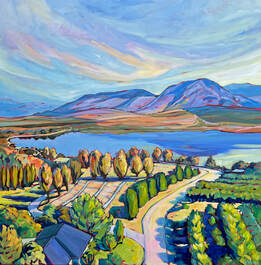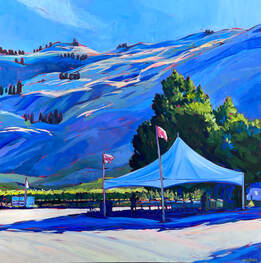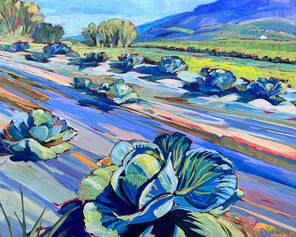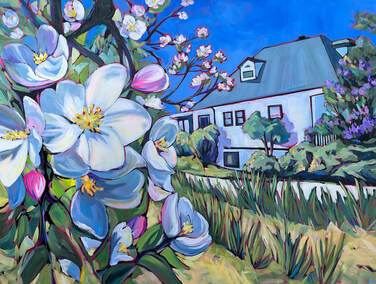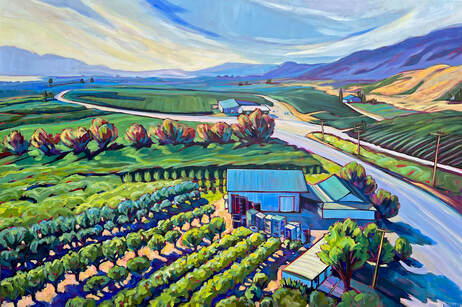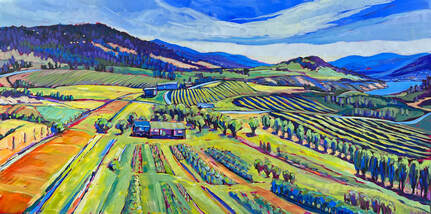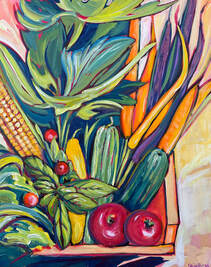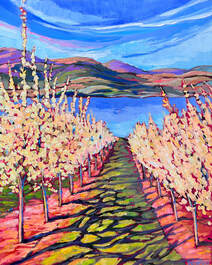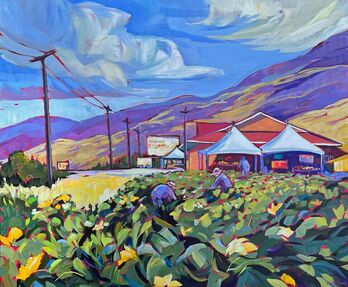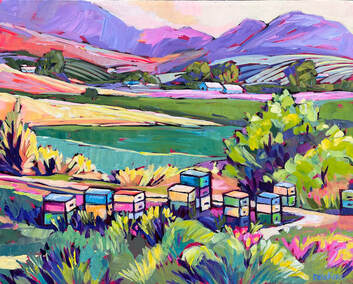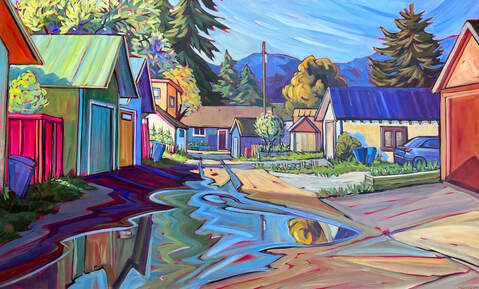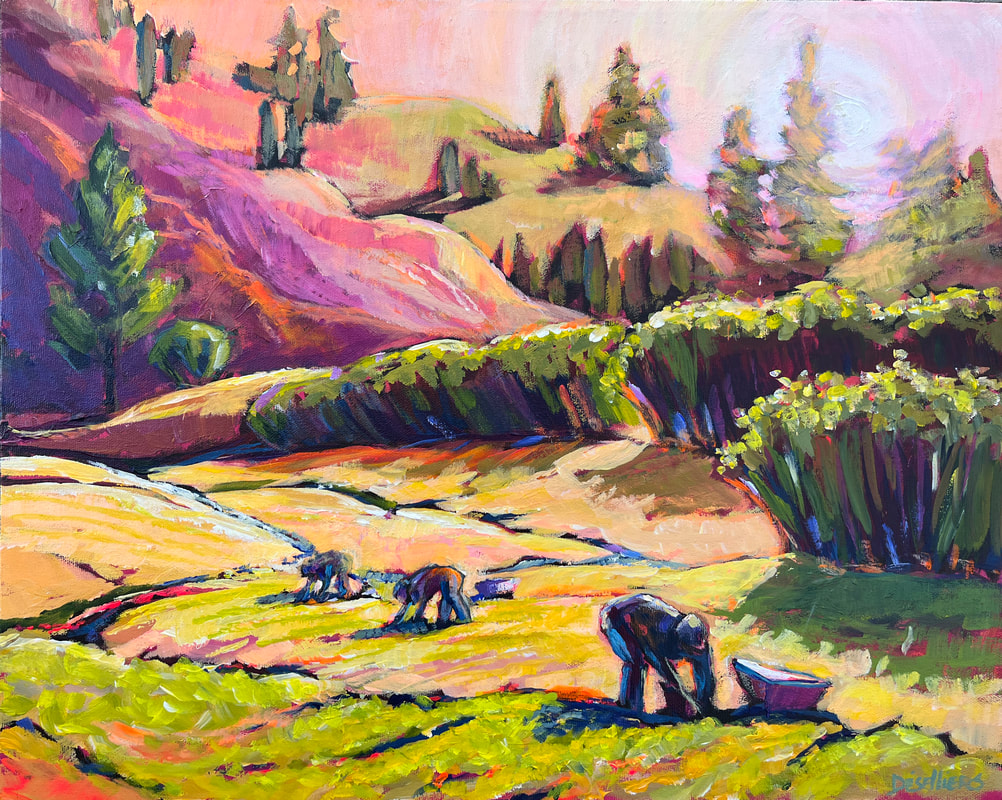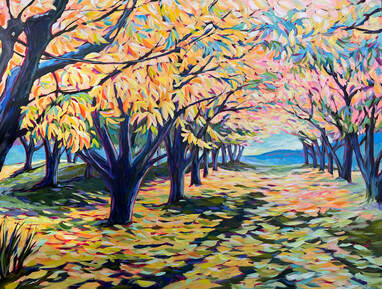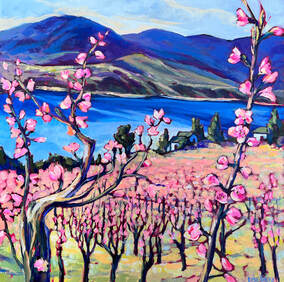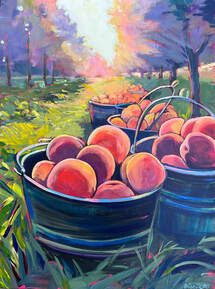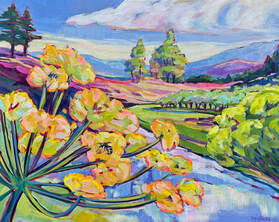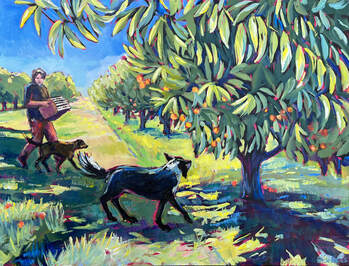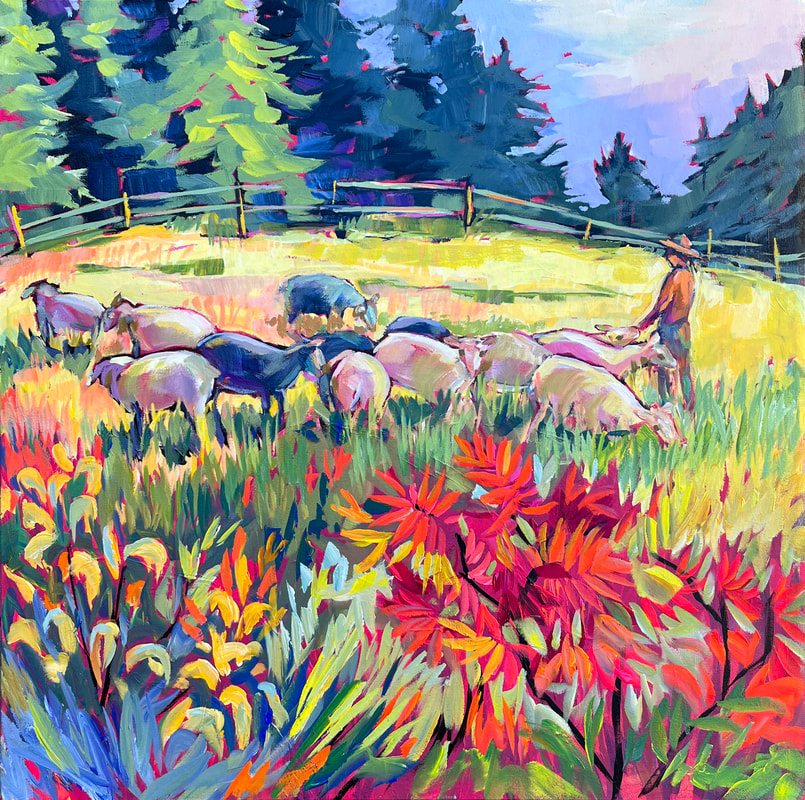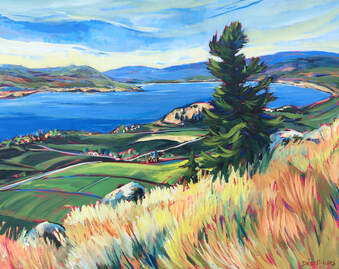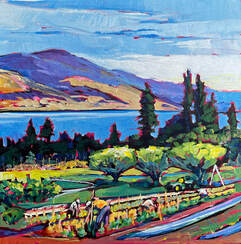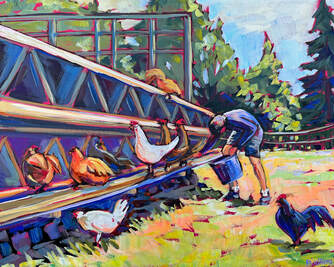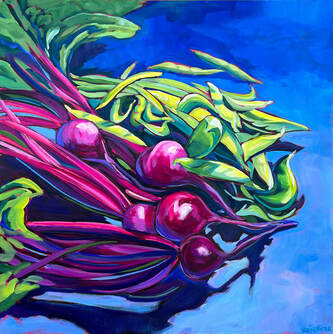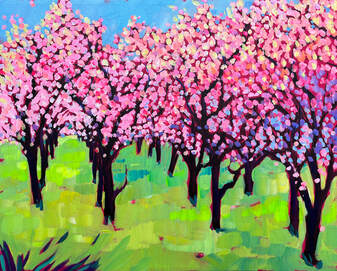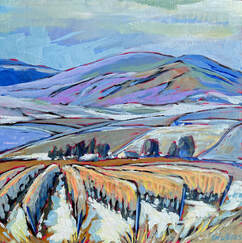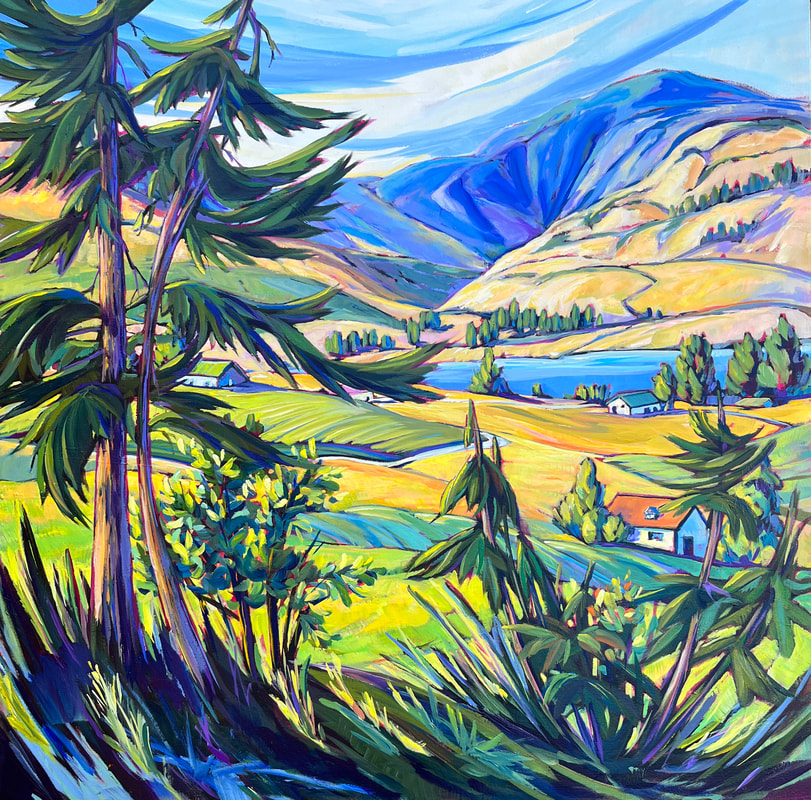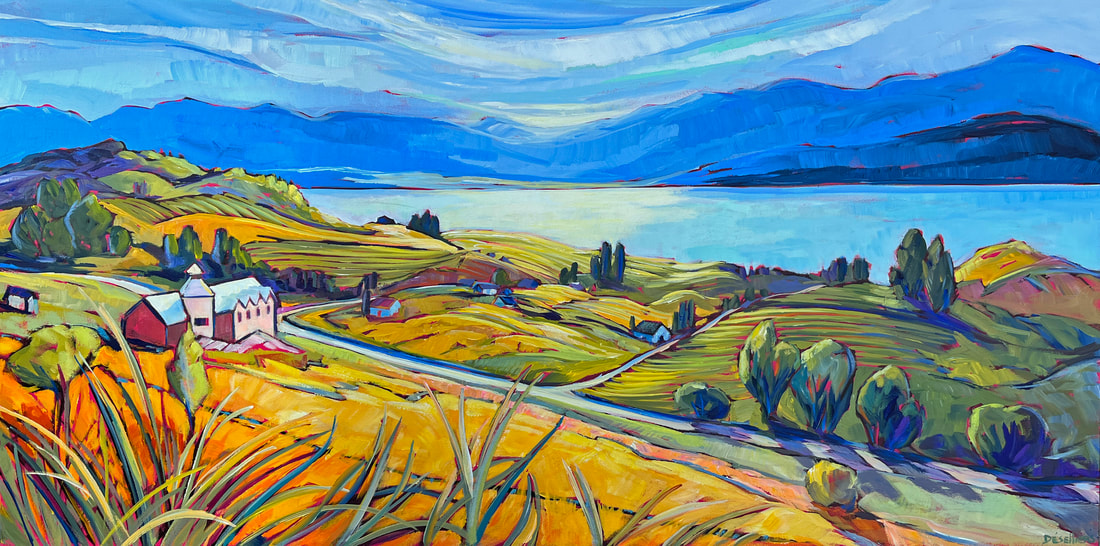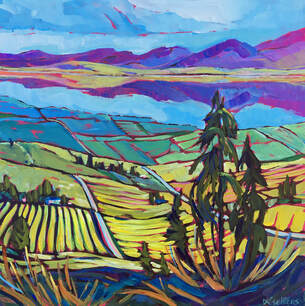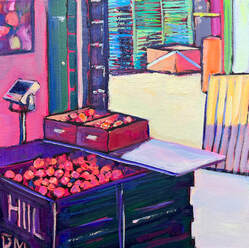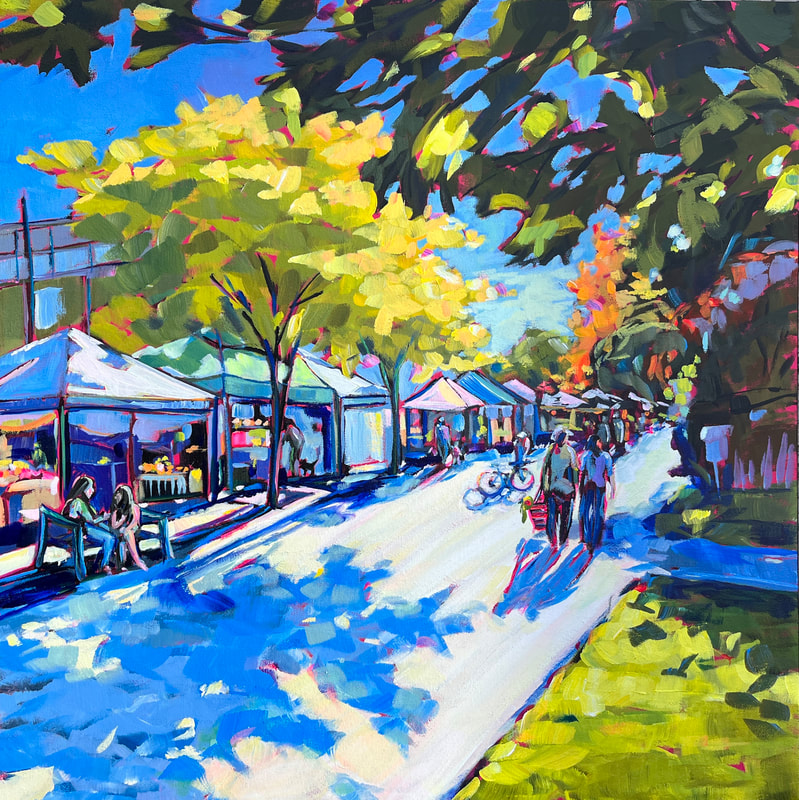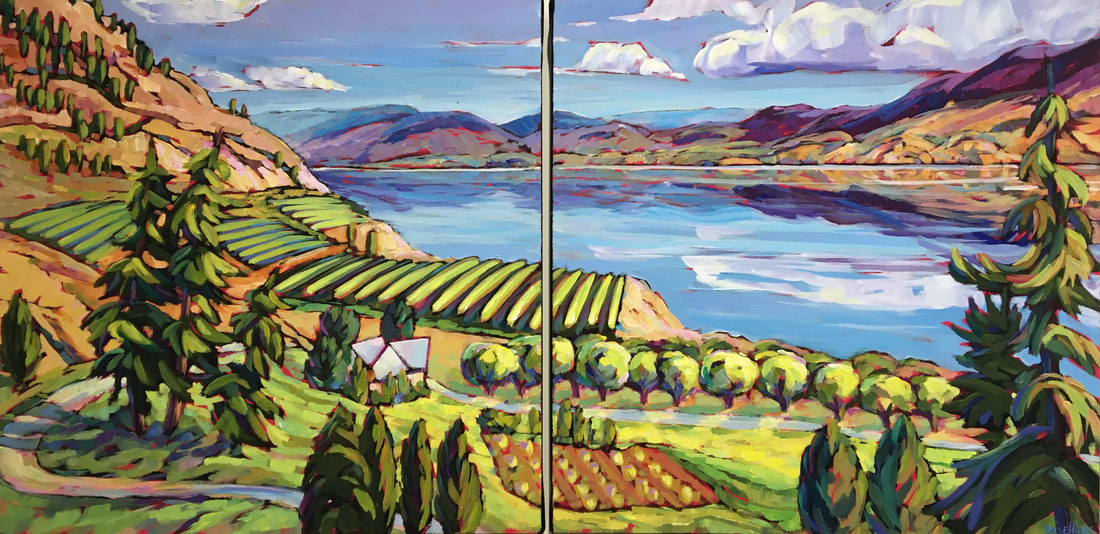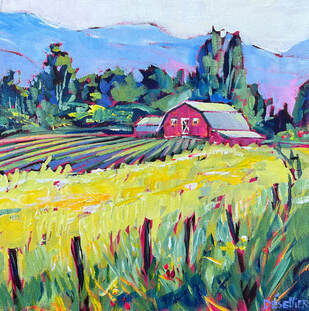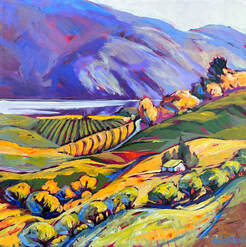We all have to eat. That, we can all agree on. And we have been made aware in the past few years that where our food comes from is important. Supply chains and food security are words now often mentioned that speak of the importance of food and where food is grown.
This Art Show “The Food We Grow” was built around the idea that food is essential and therefore farmers are important. That local food is to be valued and that the work that is involved in growing food locally and making a living from it, is of great value. This exhibition is an “Ode to the farmers”, a colorful “Thank you!” to all the people who get up really early to put in a long day of hard work so that they can sell their harvest to feed the people in their community.
The family farm faces difficulties from production cost going up and to challenges that comes from getting a fair return on their crop while educating the public as of why this cabbage or this peach cost more when grown locally, using methods that minimize the impact on the environment.
All of us cannot drop everything to save the planet from climate change. But all of us can do something. Supporting our local farmers is one of them. Going to the market on Saturdays to buy produce directly from the people who grow it, is something we can do.
This Art Show “The Food We Grow” was built around the idea that food is essential and therefore farmers are important. That local food is to be valued and that the work that is involved in growing food locally and making a living from it, is of great value. This exhibition is an “Ode to the farmers”, a colorful “Thank you!” to all the people who get up really early to put in a long day of hard work so that they can sell their harvest to feed the people in their community.
The family farm faces difficulties from production cost going up and to challenges that comes from getting a fair return on their crop while educating the public as of why this cabbage or this peach cost more when grown locally, using methods that minimize the impact on the environment.
All of us cannot drop everything to save the planet from climate change. But all of us can do something. Supporting our local farmers is one of them. Going to the market on Saturdays to buy produce directly from the people who grow it, is something we can do.
Interview with Ella Braden, organic farmer Braden Hill Orchard
Why did you get into farming?
I've always been an outdoorsy person; I grew up with a backyard garden and parents who encouraged my curiosity. While in graduate school, I volunteered on an organic farm and love the way a good farmer can partner with the land to bring forth delicious food. As my partner and I forged our own path, it became clear to me that I wanted to be nurturing an ecosystem and feeding my community. We are privileged to hold a beautiful, fertile piece of land in Silyx territory, and working with it to feed our family and community feels right.I'm a scientist by training, and I love the challenge of wrapping my brain around a new set of inputs, then synthesizing information to come up with a creative solution. Farming is an ever-changing challenge, and there are always new lessons to learn. I take the task of building soil and sequestering carbon seriously. This farm allows me to do that! I love being outside, observing and thinking, then putting thoughts to action and seeing the results. Plus, the food is delicious =)
What is/are your biggest challenge(s)?
Patience. There are no quick fixes in regenerative agriculture. When I spot a problem, I have to learn about it, figure out how best to prevent it from becoming worse, then find the root causes and address them. Sometimes that might take years! Additionally, farming is very seasonal, and we have a young family. Finding the time for my kids, my land, my partner and myself is very difficult when the apples are ripe, the garden is bountiful and frost is looming.
Where can people buy your fruits and produce?
I sell at the Penticton Farmers Market in April, May, early June, September and October and at the Summerland Farmers Market while it's going (last weekend in June until the end of September). We have an honour system table and refrigerator with fresh produce on our farm (11777 Dodwell Ave, Summerland) during season. Additionally, Local Motive Low-Waste Market in Penticton carries some of our produce (mainly greens and herbs in early spring). I'm very happy to be part of highlighting our agricultural wealth and the community of small farms in this valley!
Why did you get into farming?
I've always been an outdoorsy person; I grew up with a backyard garden and parents who encouraged my curiosity. While in graduate school, I volunteered on an organic farm and love the way a good farmer can partner with the land to bring forth delicious food. As my partner and I forged our own path, it became clear to me that I wanted to be nurturing an ecosystem and feeding my community. We are privileged to hold a beautiful, fertile piece of land in Silyx territory, and working with it to feed our family and community feels right.I'm a scientist by training, and I love the challenge of wrapping my brain around a new set of inputs, then synthesizing information to come up with a creative solution. Farming is an ever-changing challenge, and there are always new lessons to learn. I take the task of building soil and sequestering carbon seriously. This farm allows me to do that! I love being outside, observing and thinking, then putting thoughts to action and seeing the results. Plus, the food is delicious =)
What is/are your biggest challenge(s)?
Patience. There are no quick fixes in regenerative agriculture. When I spot a problem, I have to learn about it, figure out how best to prevent it from becoming worse, then find the root causes and address them. Sometimes that might take years! Additionally, farming is very seasonal, and we have a young family. Finding the time for my kids, my land, my partner and myself is very difficult when the apples are ripe, the garden is bountiful and frost is looming.
Where can people buy your fruits and produce?
I sell at the Penticton Farmers Market in April, May, early June, September and October and at the Summerland Farmers Market while it's going (last weekend in June until the end of September). We have an honour system table and refrigerator with fresh produce on our farm (11777 Dodwell Ave, Summerland) during season. Additionally, Local Motive Low-Waste Market in Penticton carries some of our produce (mainly greens and herbs in early spring). I'm very happy to be part of highlighting our agricultural wealth and the community of small farms in this valley!
Peach Hill Farm as written by the Ravi Kaler
Our Story...
When an unfortunate roofing accident occurred in 1996, none of our family could guess that the end outcome would be a thriving business in the Okanagan valley. We had never even heard of Osoyoos. That is exactly what happened when my dad had a work injury while roofing and would never be able to roof again. Our family came to Osoyoos in 1996 to take a vacation, during the visit our relatives asked if we wanted to look at an orchard and my mom scoffed! “Why look at an orchard? It’s not like we’re going to buy one,” she said. Long story short, Peach Hill Farm was the first orchard we looked at. I don’t know what my dad saw in it but in a true entrepreneurial spirit he did not hesitate to put an offer down having no fruit farming experience. The offer got accepted shortly after, so when we got back to Vancouver we put our house on sale and we had a sold sign up within 3 days. The synchronism was incredible. We were moving to the Okanagan.
Learning the craft of farming...
Farming is one tough craft to learn. It is a year round job and picking is only one of duties. All work is done by hand and only minimal duties such as cutting the grass is done by machines. That includes pruning in the winter when the trees are dormant, thinning in the spring and picking in the summer and fall.
Many people may think farming is just about waiting for the fruit to grow and picking it, but there is a massive learning curve. Pruning, thinning, picking, and spraying are just a few skills to be learnt. That means inspecting and working on every branch of every tree many times per year. The first few years my parents would volunteer at orchards and work for free in order to learn the craft, and then come back home and apply what they learned. Over the years we have built a loyal customer base and have gone from knowing absolutely nothing about farming to becoming highly knowledgeable and resourceful!
Our Story...
When an unfortunate roofing accident occurred in 1996, none of our family could guess that the end outcome would be a thriving business in the Okanagan valley. We had never even heard of Osoyoos. That is exactly what happened when my dad had a work injury while roofing and would never be able to roof again. Our family came to Osoyoos in 1996 to take a vacation, during the visit our relatives asked if we wanted to look at an orchard and my mom scoffed! “Why look at an orchard? It’s not like we’re going to buy one,” she said. Long story short, Peach Hill Farm was the first orchard we looked at. I don’t know what my dad saw in it but in a true entrepreneurial spirit he did not hesitate to put an offer down having no fruit farming experience. The offer got accepted shortly after, so when we got back to Vancouver we put our house on sale and we had a sold sign up within 3 days. The synchronism was incredible. We were moving to the Okanagan.
Learning the craft of farming...
Farming is one tough craft to learn. It is a year round job and picking is only one of duties. All work is done by hand and only minimal duties such as cutting the grass is done by machines. That includes pruning in the winter when the trees are dormant, thinning in the spring and picking in the summer and fall.
Many people may think farming is just about waiting for the fruit to grow and picking it, but there is a massive learning curve. Pruning, thinning, picking, and spraying are just a few skills to be learnt. That means inspecting and working on every branch of every tree many times per year. The first few years my parents would volunteer at orchards and work for free in order to learn the craft, and then come back home and apply what they learned. Over the years we have built a loyal customer base and have gone from knowing absolutely nothing about farming to becoming highly knowledgeable and resourceful!
